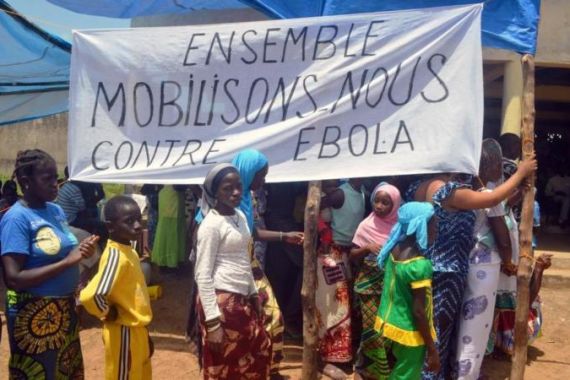Ebola in Guinea: Is government incompetence a bigger danger?
While the West finally mobilises to help fight Ebola, some in West Africa are still in denial.

The Ebola crisis has been growing in West Africa since the end of last year, with no immediate signs of it ending. Just this week, the United States Center for Disease Control estimated that 21,000 could be infected by the end of the month, while the World Health Organization (WHO) said in the worst-case scenario 1.4 million could be infected by the end of January – if the spread is not stopped now. While the world has looked on with growing horror at the rapid spiral of growth, some in West Africa seem trapped in a state of denial about the scale of the problem we face.
International help is desperately needed – the Chinese, Cubans, and Ugandans have been here for weeks, and now the West is coming too. In Guinea, where the outbreak started, France is taking the lead, sending military doctors and its civil protection agency staff backed by air support in order to set up a military hospital in the worst affected areas.
Keep reading
list of 4 itemsWhat is Trident, the US floating pier off Gaza? Will it work?
Does Israel’s Netanyahu have a plan for a ‘day after’ the war on Gaza?
Why Egypt backed South Africa’s genocide case against Israel in the ICJ
In neighbouring Liberia, the government declared a State of Emergency and closed its borders. In Sierra Leone, the government introduced a nationwide three-day lockdown. But in Guinea authorities have been strangely passive in the face of the threat. While they have hesitated, fear has gripped the country and as the fatal attack on eight healthcare workers shows, rumours and misinformation have filled the vacuum where the government’s public education on the disease should be.
Fear of image damage
The outbreak started in the remote southeastern forest region of Guinea – la Forestiere – in December 2013. At first, no one knew what the disease was, but even when Ebola was confirmed, the government still failed to take it seriously. For months it refused to admit the scale of the problem, fearful that doing so would damage Guinea’s image. Aid agencies, such as Medecins Sans Frontieres, valiantly battled the virus almost on their own, while vital months were wasted before a government that only spends a pitiful 2.4 percent of its budget on healthcare, instead of the WHO recommended 15 percent, called for outside help. Instead, it spent its time criticising the opposition for scare-mongering and waited until our limited health structures had been overwhelmed.
|
|
| Counting the Cost – Ebola: Infecting West African economies |
Back in August when Liberia’s and Sierra Leone’s presidents skipped the US-Africa Summit to stay at home to deal with the crisis – Guinea’s President Conde flew out to Washington for the US Summit but he came back with little more than photos with President Obama instead of an aid package to tackle Ebola.
Only now with Ebola having spread to 17 of Guinea’s 33 districts is the government beginning to wake up, but it is too late to regain public trust. We have tried to maintain a political consensus but now the government’s incompetence is a bigger danger to the Guinean people than the risk of politicising the disease. The crisis has exposed a deep-seated distrust of the government, especially in la Forestiere, which has traditionally been starved of government resources and where only last year over 100 people were killed in ethnic clashes.
Fear and stigma
Fear and stigma are preventing aid and medical relief getting through to affected areas and even the little they are doing now is viewed with suspicion. In the absence of a coherent public education programme rumours that foreign aid workers are either spreading the disease or are inventing Ebola so that they can harvest organs for sale in the West are rife.
The tragic death of eight health workers and journalists last week has thrown the Guinean authorities’ failures into stark relief. The health workers were attempting a belated public education programme in the village of Wome where the first Ebola cases were reported, but they were attacked by villagers fearing that the disease was being brought to them. Since then, the negative international publicity has spurred the government into action, arresting 27 people this week. What a pity it did not show the same kind of speed and determination in tackling the outbreak itself.
The international effort to combat Ebola now under way has the chance to break the back of this outbreak and prevent it from spiralling out of control and dragging not only the three most affected states but the whole of West Africa into a nightmare scenario. However, the sad truth is that a government as saddled with incompetence and corruption as Guinea’s current one cannot be trusted to either spend aid relief money wisely nor put in place the long-term measures necessary to prevent a similar outbreak occurring again in the future.
Cellou Dalein Diallo is Former Prime Minister of Guinea and President of UFDG.
